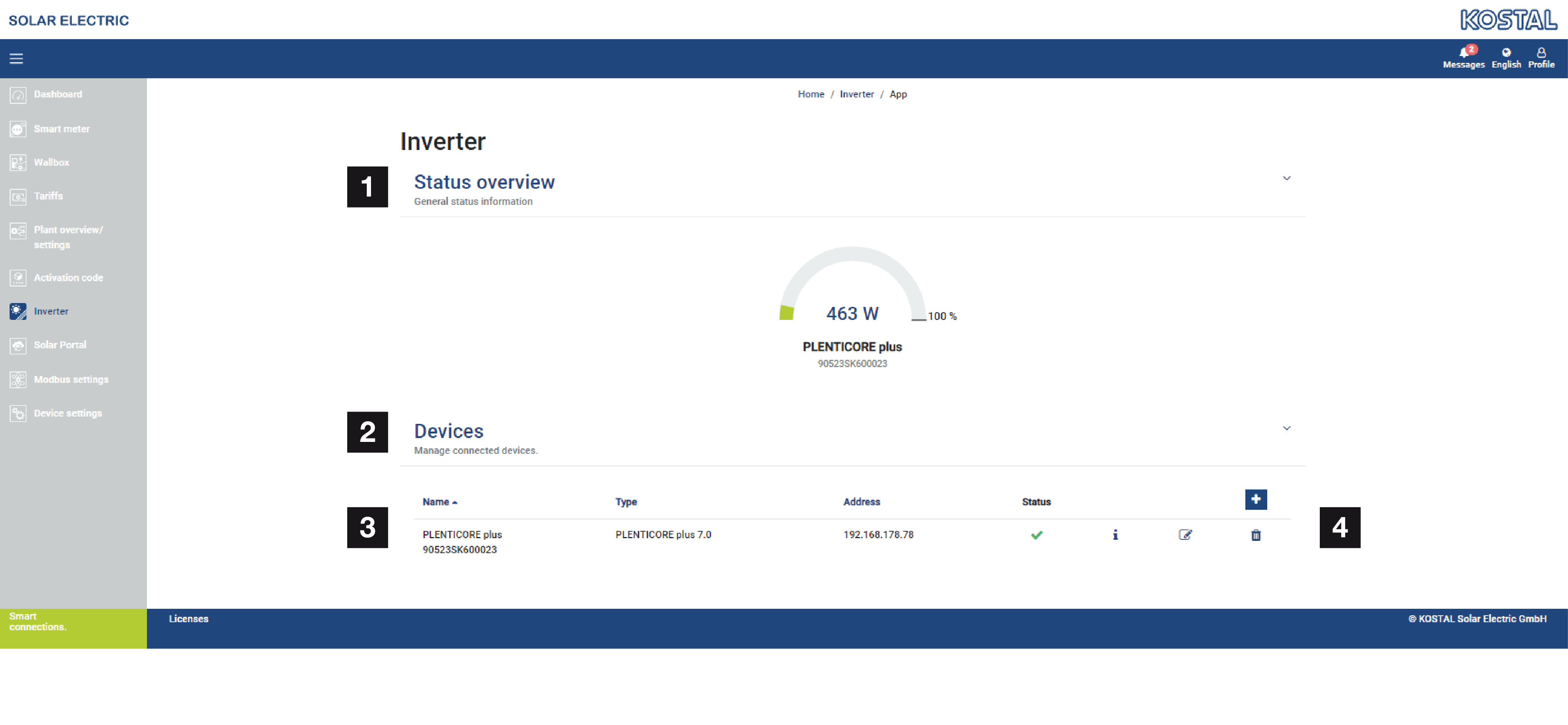Menu - inverter

1 | Inverter status overview |
2 | Overview of the connected devices |
3 | Connected devices |
4 | Option for configuring connected devices |
The KOSTAL Smart Energy Meter is linked to the KOSTAL solar inverters to reduce the feed-in capacity of inverters, if required, or to control the battery when using the PIKO MP plus.
In addition to this, the KOSTAL Smart Energy Meter can be connected to the KOSTAL Solar Portal to transfer data from the KOSTAL Smart Energy Meter and inverter to the portal.
Status overview
Shows general information about the devices.
Devices
Shows all connected inverters or batteries linked to the PIKO MP plus.
New devices can be added using the Plus (+) button. The type of communication (TCP or RS485) used between the inverter and KOSTAL Smart Energy Meter is determined by the choice of inverter (e.g. PIKO IQ or PIKO MP plus).
If the "Battery management" function is selected in addition to the PIKO MP plus, the communication interface to the battery and a depth of discharge (SoC) can be selected.
INFO

“Battery management” is only displayed if the additional battery option has been activated for the PIKO MP plus using an activation code.
Different parameters have to be configured depending on the device type. If all relevant settings have been configured, detection of the inverter can be started by pressing the OK button.
INFO

Only then is a device added to the KOSTAL Smart Energy Meter if the inverter was detected successfully.
Parameter | Explanation |
|---|---|
PIKO MP plus | A PIKO MP plus inverter is to be set up. Select the corresponding type or power class of the inverter. This automatically sets the maximum AC output power of the inverter. This type of inverter communicates using the RS485 interface. To connect the inverter, you will need to state the RS485 interface of the KOSTAL Smart Energy Meter to which the inverter was connected. If there are several inverters, different RS485 addresses should be used. The value for “Timeout” does not need to be changed. For more information, see “Timeout” on the next pages. Battery management: If a battery is to be set up for the PIKO MP plus, you can activate battery support for this here. You should then select the communication interface (RS485) of the KSEM to which the battery’s communication cable is connected. For more information about the settings, see “Battery” on the next pages. |
PLENTICORE plus | A PIKO IQ, PLENTICORE plus or PLENTICORE BI inverter is to be set up. Select the corresponding type or power class of the inverter. This automatically sets the maximum AC output power of the inverter. This inverter communicates using TCP. The IP address has to be stated for the connection. The unit ID does not have to be changed. With a PLENTICORE plus, you still have to select whether you have connected a battery to the inverter so that this value is taken into account in the calculations/displays. |
PIKO FW >= 5.0 | A PIKO 3.0-20 or PIKO 36 EPC inverter is to be set up. Select the corresponding type or power class of the inverter. This automatically sets the maximum AC output power of the inverter. This type of inverter communicates using TCP (LAN). The IP address has to be stated for the connection. |
PIKO CI | A PIKO CI inverter is to be set up. Select the corresponding type or power class of the inverter. This automatically sets the maximum AC output power of the inverter. This type of inverter communicates using TCP (LAN). The IP address has to be stated for the connection. |
Battery | A battery is to be set up for a set-up PIKO MP plus. Linking with inverter Select the inverter to which the battery is connected. This must be set up beforehand so that it is displayed here. Serial interface The battery communicates using the RS485 interface. To connect the battery, you will need to specify which RS485 interface of the KOSTAL Smart Energy Meter the battery’s communication cable was connected to. Battery type Select the battery type, e.g. BYD HVM or BYD HVS. Number of modules Select the number of modules installed in the battery. Max. SOC (charging status) The battery's maximum charging status must be set here (default 100 %). Min. SOC (charging status) The minimum charging status of the battery must be set here. Note the details provided by the battery manufacturer (default 5 %). Nominal charge/discharge capacity of battery This value is set automatically and does not need to be changed. It is calculated using the battery type and the number of modules. However, it can be adjusted if the values do not match the battery. |
Timeout | This value in seconds indicates the time after which an error message is output in the event of a fault in communication with the configured device. |
Maximum output power | It is essential that this value is set for every connected inverter. By selecting the inverter's type or power class, the inverter's maximum output power is automatically set. The maximum output power is the maximum output which the inverter being configured is able to deliver. The value for the max. output power only depends on the inverter type and design. The actual capacity of the connected solar modules is not relevant for this setting. |
Explanation of device overview
Parameter | Explanation |
|---|---|
Name | Shows the name which the user has given to the KOSTAL solar inverter. The name is assigned via the inverter menu interface. |
Type | Shows the type designation of the inverter/battery. |
Address | Either the IP address or RS485 address of the inverter is shown. |
Status | Status display of communication to the inverter. Two different statuses are possible: OK (√) indicates that communication with the inverter is working normally. Error (!) means that communication with the inverter is interrupted. |
Info (i) | Additional information, such as serial number, hardware and software versions, can be retrieved via the Info symbol. OK (√) indicates that communication with the inverter is working normally. Other values are an error code. |
Edit (pen symbol) | The “edit symbol” (pen symbol) can be used to modify the configuration of a connected inverter/battery. Changes only take effect once they have been confirmed with OK. |
Delete (bin symbol) | An inverter can be deleted from the KOSTAL Smart Energy Meter using the bin symbol. |